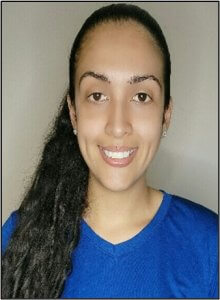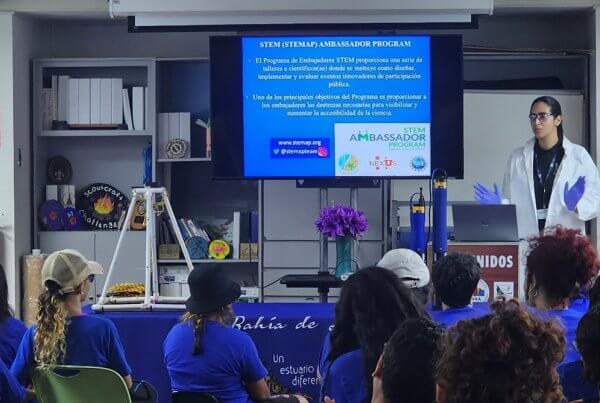Edlyn Jusino Presents Stories of Women in Science to Upward Bound in Puerto Rico

Womens in the Science
Science is precious, Science is present in everything in the life, at all stages. Life is not the same for everyone, for various reasons, place of birth, upbringing, social status, economic status, languages, among other factors. Not everyone has the facility to have Science in their hands or in their life with accessibility. I was born and raised in Puerto Rico, a beautiful island, with very beautiful nature and biodiversity, where the main language is Spanish. Being a Spanish-speaking island, it has limitations in many aspects, including the lack of job opportunities in Science, especially for women. Even though gender equality is currently professed, there is still a long way to go, recognizing and valuing women in the professional field around the world. Barriers in Science should not exist under any circumstances, we can all become the Scientists we want to be.
Since I was little, I knew that Science would be my area of study and life. I was the first member of my maternal family to attend college, graduating with a Bachelor’s and Master’s Degree. All this thanks to similar programs, as wonderful and necessary as Upward Bound from the United States Department of Education. My area of expertise is Environmental Sciences with a focus on Water Quality. I am also passionate about Environmental Justice and Environmental Awareness, being able to raise awareness, providing an example to our children and youth mainly, that dreams can be achieved with determination. I would love to be able to travel the world and carry the message of environmental preservation, conservation and protection. You can become whatever you want to be.
For these and other reasons, I chose the Upward Bound Program from Pontifical Catholic University of Puerto Rico, Ponce Campus. “Upward Bound is one of eight TRIO programs, Upward Bound provides fundamental support to participants in their preparation for college entrance. The program provides opportunities for participants to succeed in their precollege performance and ultimately in their higher education pursuits. Upward Bound serves: high school students from low-income families; and high school students from families in which neither parent holds a bachelor’s degree. The goal of Upward Bound is to increase the rate at which participants complete secondary education and enroll in and graduate from institutions of postsecondary education. Upward Bound projects provide academic instruction in mathematics, laboratory sciences, composition, literature, and foreign languages. Tutoring, counseling, mentoring, cultural enrichment, work-study programs, education or counseling services designed to improve the financial and economic literacy of students; and programs and activities previously mentioned that are specially designed for students who are limited English proficient, students from groups that are traditionally underrepresented in postsecondary education, students with disabilities, students who are homeless children and youths, students who are in foster care or are aging out of foster care system or other disconnected students.1”
I promoted the stories of part of the women who make up the team (Edlyn Jusino [Biologist III, SWMP Technician of JBNERR], Nilda Peña [Environmental Educator of JBNERR], Nicole Rivera [Fellow of SEAS Alliance Program- Research Assistant of Inter American University of Puerto Rico, Metro Campus] and Gabriela Rodriguez [Summer Intern (May-June 2024) – Undergraduate Student of Delaware Valley University]) of the Jobos Bay National Estuarine Research Reserve “JBNERR”2 and promoted the Science in all students, professors and staff at the presentation day. This focal group varied from 7-12 grades students, different ages + staff + professors and had a participation of 58 members, for a total of 64 people participating in the activity. The activity took place at the Visitor Center of the Jobos Bay National Estuarine Research Reserve “JBNERR”. The main topic chosen for the STEMAP presentation was WOMENS IN THE SCIENCE, where there was also a discussion about personal protective equipment used in different areas including scientific laboratories, field, water, etc.; instrumentation for collecting water quality parameters was presented, an innovative structure with which research is carried out on seagrass and the history of the Jobos Bay National Estuarine Research Reserve, including a tour of the nature that comprises the Reserve.
This focal group is awesome, excellent, all persons have a genuine interest for the Science, environment, nature, animals and conservation in general. In my part of the presentation I started with this theme, who here likes science? Please raise your hand. I am very happy that some students raised their hands, and their genuine interest was seen. After that I explained what the STEMAP Program is, what is the objective and general summary. This group was participated and asked a few questions in the presentation and after presentation the staff and professor asked some questions about the JBNERR Programs offers research opportunities, internships, and others. And in the guide tour, participants interacted with nature and asked a few questions. Things to improve: I think I need to acquire more knowledge and skills to speak in front of an audience.
I appreciate STEMAP for the opportunity to continue promoting science to more people, I thank the other presenters of the activity: Nilda Peña, Nicole Rivera and Gabriela Rodriguez, for presenting their stories in the science and inspiring others and special thanks to other staff of JBNERR: Angel Dieppa [Research Coordinator] and Milton Muñoz [Stewardship Coordinator] both talked with the Programs and opportunities of collaboration, research, volunteer at JBNERR, and I thank the Upward Bound Program from Pontifical Catholic University of Puerto Rico, Ponce Campus for their participation and interest in Science. Thanks to all the participants!
The world is our home, let’s never stop protecting, conserving, and preserving it!
- Federal Trio Programs: https://www2.ed.gov/programs/trioupbound/index.html
- Puerto Rico Department of Natural and Environmental Resources, Jobos Bay National Estuarine Research Reserve “JBNERR”: https://www.drna.pr.gov/jbnerr/, https://coast.noaa.gov/nerrs/reserves/jobos-bay.html, https://cdmo.baruch.sc.edu/

About the Blog
Discussion channel for insightful chat about our events, news, and activities.
Categories
Featured Posts
Tag Cloud
- STEMCAP (1)
- tattoos (1)
- dinosaurs (1)
- microscopy (1)
- conservation (2)
- education (1)
- Puerto Rico (2)
- bilingual (1)
- UoG (2)
- Guam (2)
- ethnobotany (1)
- environmental policy (1)
- student immersion (1)
- engineering (1)
- Virgin Islands (1)
- USVI (2)
- lionfish (1)
- children's home (1)
- marine ecology (1)
- youth (1)
- sustainability (2)
- Utah (1)
- Arizona (1)
- Nevada (1)
- southwest (1)
- virtual (1)
- project management (1)
- training (1)
- naturalist (1)
- forest (1)
- ecosystem (1)
- Spanish (1)
- library (1)
- Huntington's (1)
- medical science (1)
- Emmanuel Ngwoke (1)
